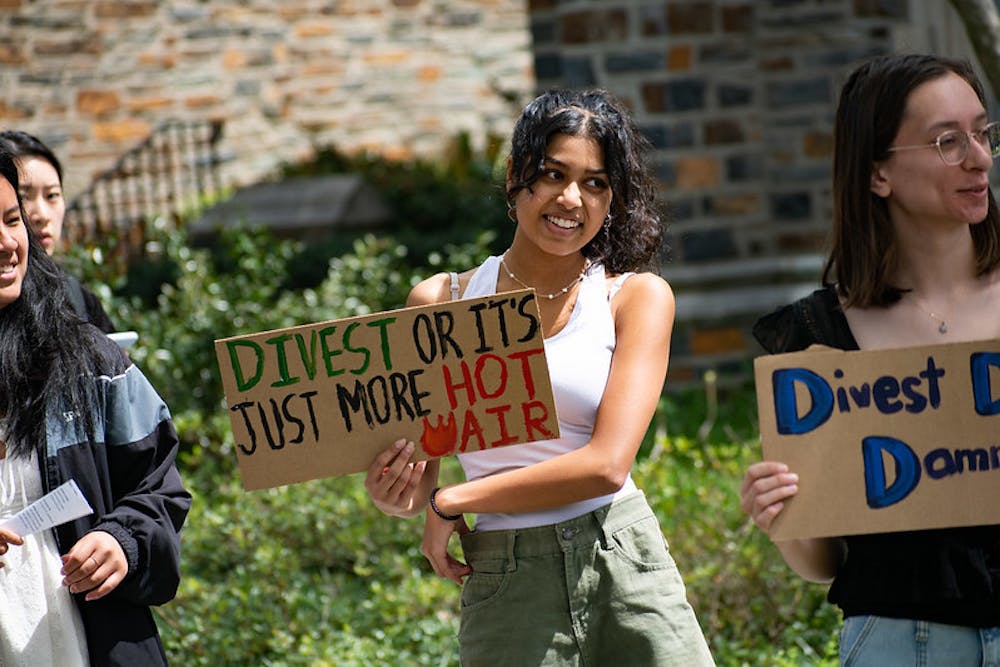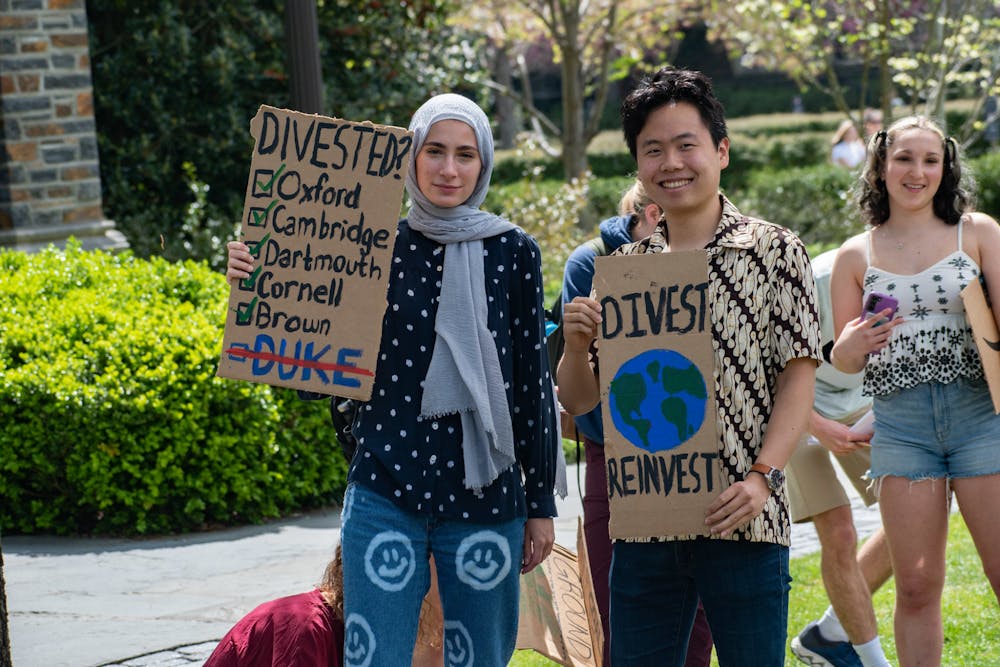The Duke Climate Coalition has filed a legal complaint against the Duke over fossil fuel divestment, the group announced at a Wednesday afternoon protest outside the Allen Building.
The purpose of the complaint is to call on North Carolina Attorney General Josh Stein to investigate potential legal violations associated with Duke’s fossil fuel investments.
Students and supporters gathered to demand that Duke divest from fossil fuels, following a recent referendum overwhelmingly in favor of divestment. During the protest, DCC Treasurer Brennan McDonald, a sophomore, criticized Duke’s reluctance to begin divestment efforts despite the referendum.
“Duke has not budged and has refused to take action,” McDonald said. “That is why earlier today, DCC, supported by the Climate Defense Project, filed a legal complaint that calls for an investigation into the administration for refusing to divest from fossil fuels.”

McDonald said the legal complaint was a new tactic for achieving divestment, a not-so-new goal that students have been campaigning for over the years.
“I'm assuming that we're all well aware of the ethical and scientific reasons for taking action on climate change,” he said. “But there are also clear legal guidelines that mandate how our institutions respond to the crisis.”
Following McDonald, junior Sarah Kelso read aloud to protesters a section from the complaint that focused on the disproportionate effects of climate change on marginalized communities, highlighting the economic instability of fossil fuel investment.
First-year Abby Saks, a member of DCC who also published a recent op-ed in The Chronicle, pointed to the conflicting interests of Duke’s Board of Trustees as one of the reasons the University still hasn’t divested from fossil fuels.
“Divestment is necessary to prevent the deaths of millions of people,” Saks said. “But personal interests are currently obscuring any legitimate concern for many members of the Board.”
Saks mentioned by name three members of the Board of Trustees: Robert Penn, president of three oil and gas production companies; Michael Rhodes, an executive at TD Bank; and General Motors CEO Mary Barra, who was recently announced as the Class of 2022’s commencement speaker.
Senior Katherine Li, who attended the event, emphasized how important divestment from fossil fuels truly is despite some calling it symbolic.
“[Duke divesting] would build momentum for other schools and other powerful institutions to do that,” Li said. “We have a big role to play here as students to demand better from our administration.”

Recently, student activists at universities across the country have filed similar legal complaints, aiming to kickstart divestment after years of little change from administrative bodies.
The complaint, which is 61 pages, puts forth a number of claims to demonstrate the potential illegality of Duke’s fossil fuel investments. The overarching message is that Duke as a nonprofit institution violates legal requirements for the use of charitable assets. It claims that the University violates the fiduciary duties of nonprofit corporations under North Carolina law.
Get The Chronicle straight to your inbox
Sign up for our weekly newsletter. Cancel at any time.
The complaint frames fossil fuel investment as a financial risk given future uncertainty and the potential for fraudulent investment. Furthermore, according to the complaint, the Board of Trustees fails to uphold its social and environmental commitments. Saks said during the protest that conflict of interest among trustee members is also a concern and potential cause for investigation.
The DCC’s complaint was signed by 14 climate science and policy community members, 11 Duke faculty members and 12 organizations such as the Sunrise Movement, Durham Hub and Operation Climate. Of the 12 organizations, nine are Duke student organizations, including the Asian American Studies Working Group and Duke Environmental Justice Network.

Junior Leah Roffman, an attendee at the protest, expressed frustration at Duke’s refusal to divest from fossil fuels.
“I think that the administration's arguments are not really holding up,” Roffman said. “They need to reflect the urgency of the climate crisis and actually live up to their words.”
After the event, student organizers were optimistic that the legal complaint would compel initiative from the University administration.
“Hopefully, this aggressive action really shows the administration that there's no time left for them to stall on divestment,” McDonald said.
Saks said she is “cautiously hopeful.”
“We have to divest now, President [Vincent] Price,” Saks said at the end of the protest. “We are calling on you to do what is not only good for the planet and community as a whole but also for what is consistent with what the University claims to be.”

Vishal Jammulapati is a Trinity sophomore and an associate news editor of The Chronicle's 118th volume.

